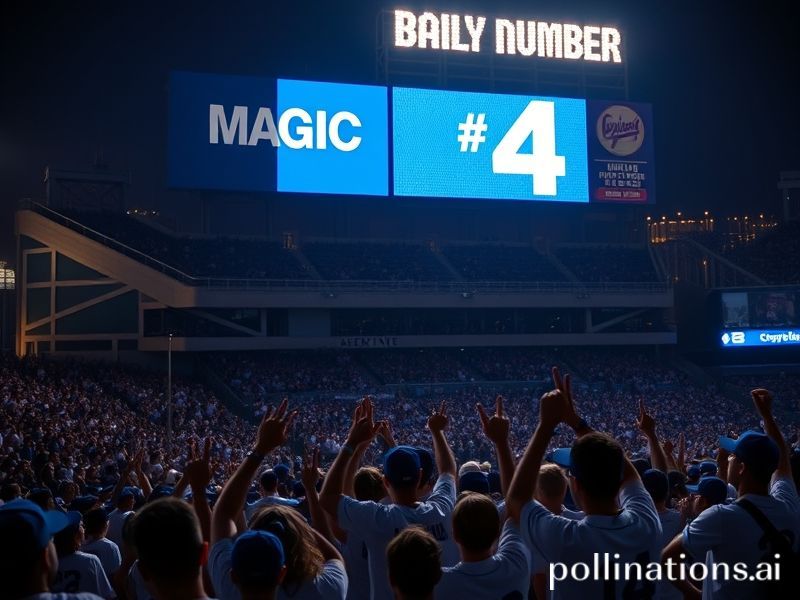Dodgers’ Magic Number: The World’s Tiniest Countdown to Manufactured Hope
The Dodgers’ Magic Number: A Decimal in a World Running Out of Numbers
By J. B. Vespers, International Correspondent
LOS ANGELES—While the Eastern Hemisphere slept off another round of sovereign-debt nightmares, a spreadsheet cell in Chavez Ravine quietly ticked from “6” to “5.” In baseball shorthand, that single digit is the Dodgers’ “magic number”—the alchemic remainder of games that, once exhausted, transmutes a regular season into October champagne and regional bragging rights. Globally speaking, it’s a rounding error. Locally, it’s scripture.
Consider the absurdity: a city currently negotiating with tectonic plates for the privilege of remaining above sea level pauses to divine cosmic significance from a subtraction problem involving millionaires in elastic pants. Yet the arithmetic travels. By dawn in Karachi, cricket fans—whose own sport is busy discovering creative new ways to implode—were forwarding screenshots of Dodger-blue graphics captioned “Magic Number = 5” with the same reverence they reserve for IMF statements. Somewhere in Lagos, a data analyst on a four-hour Zoom call glanced at the push alert and muttered, “If only we could quantify our power outages so elegantly.”
The magic number isn’t merely American kitsch. It’s a rare exportable metaphor for managed decline. France has cheese, Japan has bullet trains, and the United States has the ability to reduce existential uncertainty to a tidy integer you can fit on a foam finger. Europeans, who prefer their fatalism artisanal, sniff at such optimism. But they still track it. Bild, Germany’s most restrained tabloid, ran a sidebar explaining the formula (163 − wins − opponent losses = hope) next to a photo of a Bundesliga coach whose own magic number is measured in parliamentary seat projections.
The international fascination makes perverse sense. In a year when global supply chains resemble a Jenga tower supervised by toddlers, it’s comforting to watch a franchise with a payroll roughly equal to Iceland’s GDP distill destiny into simple subtraction. The Dodgers, after all, are the McKinsey of Major League Baseball—data-obsessed, lavishly resourced, and morally suspect—so their numeric countdown feels like late-stage capitalism’s version of a doomsday clock, only running backwards and sponsored by a crypto exchange.
Still, the number carries geopolitical echoes. China’s Belt and Road Initiative is effectively an attempt to manufacture a magic number for infrastructure: miles of track, tons of concrete, and a diminishing tally of solvent borrowers until Beijing owns the metaphorical pennant. Meanwhile, Russia, never one to trust arithmetic it didn’t falsify, invaded Ukraine at least partly to remind everyone that territory can’t be reduced to sabermetrics. Against that backdrop, a baseball team’s stepwise march toward 0 feels quaint—like using long division to predict the apocalypse.
Back in Los Angeles, civic anxiety is calibrated to each incremental drop. Sports-talk radio hosts speak of the number with the solemnity usually reserved for wildfire acreage. Local breweries release limited-edition IPAs labeled “Magic #5” that taste faintly of denial and grapefruit. Fans wear T-shirts emblazoned with the integer in the same font the county uses for evacuation orders—a design choice that is either gallows humor or unconscious confession.
The broader significance, if we must pretend there is one, lies in the number’s fragile universality. It is simultaneously meaningless and vital, a placebo for societies allergic to ambiguity. When the counter finally hits zero, fireworks will bloom over Elysian Park, and for nine innings the world’s assorted crises will be politely asked to wait outside. Then the next season begins, and the ledger resets to 163, because hope, like debt, is endlessly renewable.
In the end, the Dodgers’ magic number is just a polite fiction we agree to observe—like democracy, or expiration dates. It won’t stop the oceans from inching toward the concession stands, but it does provide a tidy column in the box score of civilization. And really, what more can you ask of a single digit in 2024?







